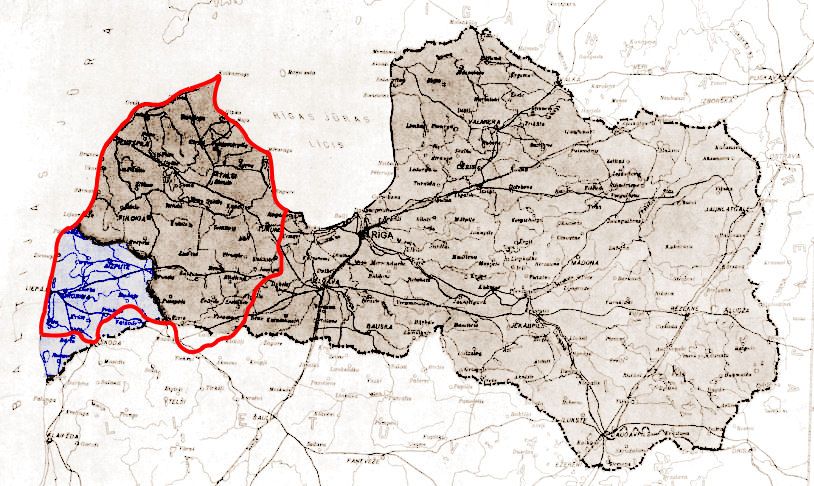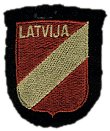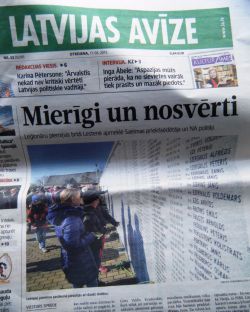Originally posted at www.defendinghistory.com, published 4 September 20161
Some High Latvian Politicians Think the Waffen-SS Fought for Freedom
There are here in Latvia some high-ranking Latvian politicians who 1actually believe that the country’s Waffen-SS fighters fought for freedom of their country. Every year on the 16th of March Latvian nationalists gather at the Freedom Monument in the heart of Riga, the nation’s capital, and in the cemetery at Lestene, a village some seventy-two kilometers from Riga, to remember and 2honor (honor!) the living and dead veterans of the Latvian Legion of the Waffen-SS.
 Dr. Aleksandrs Feigmanis (Rīga)
Dr. Aleksandrs Feigmanis (Rīga)Established by order of Adolf Hitler on the 10th of February 1943, they fought 3for Nazi Germany 4against the Red Army on the Volkhov front near Leningrad, and later in Great River region, Kurzeme (Kurland), in Poland, Germany and elsewhere.
Although the 5alarming series of annual events commemorating and glorifying the Latvian SS Volunteer Legion events are now officially non-governmental, some MPs and even ministers do not hesitate to not only participate publicly, 6setting an example for the nation’s youth, but also to 7publicly refer to Waffen-SS legionnaires as heroes and national freedom fighters. 8Had Hitler won the war, there would have been no Latvia left to become free in 1991. By 9swearing an oath to Adolf Hitler’s genocidal regime, and then 10in fact delaying the liberation of the concentration camps by the Allies, they were 11pawns of the Nazis who do not deserve to be glorified by a modern, democratic member of the European Union and NATO.
For example, on 16 March 2014 in the commemorative events in the cemetery of Waffen-SS legionnaires in Lestene were graced by the 12very public presence and support of Dace Melbarde, who is today Minister of Culture of Latvia, and MEP Karlis Šadurskis, now the Minister of Education. In their speeches, they called the Waffen-SS legionnaires “fighters for freedom of Latvia” (see report in the newspaper Latvijas Avize, 17 March 2014, p. 2).
One year later, on March 16, 2015, the same commemorative events for the Waffen-SS legionnaires attracted the 13enthusiastic participation of Justice Minister Dzintars Rasnacs, Culture Minister Dace Melbarde, plus seven members of parliament from the National Association party and one member of the Unity party. Both parties are 14members of the ruling coalition. In addition, one of the events held in Lestene was attended by representatives of the Latvian armed forces and the Number Two in the state ladder of authority, Speaker of the Saeima (Latvian Parliament) Inara Murniece.
In her speech, Speaker Murniece recalled that in 1950 the United States recognized the Latvian and Estonian SS legions as 16“different” from the German SS divisions whose fighters were actual members of the Nazi Party. She stressed that the Latvian and Estonian SS legions 17did not in her view commit war crimes or crimes against humanity. A report on the commemorative events in Lestene was published on the front page Latvijas Avize of 17 March 2015. The article featured a photograph of children at the memorial stele that features the names of perished Latvian Waffen-SS. The caption to the photo reads: “Many pupils also participated in the commemorative events in Lestene.”
For future historians 18it will be a curiosity that leading Latvian politicians, praising the Waffen-SS legionnaires fighting in the army of Nazi Germany, do not meet with the tiniest official response from the Israeli Embassy or indeed the official Latvian Jewish community leadership.
I asked the head of a Jewish research organization that works closely with the Ministry of Culture of Latvia whether he would consider, bearing in mind the suffering and the number of victims of genocide by the Nazi regime in Latvia, to 19protest against the minister‘s description of the Waffen-SS as “fighters for the freedom of Latvia.”
He replied that he would not make any statement but that the speeches of his country‘s Minister of Culture are not of interest to him.
Aleksandrs Feigmanis, who holds masters and doctoral degrees, is a Riga-based historical and family tour guide and genealogist in Latvia, Lithuania, Belarus, and Ukraine. Dr. Feigmanis‘s websites are www.balticgen.com and www.balticgentour.com. His earlier contributions to defendinghistory.com are available here.
Examination
We hope that some day the role of the Latvian Legion/Waffen-SS will be the subject of historical analysis and not the target of polemics. However, even as you read this, seventy-eight years after the end of World War II, the polarized divide between, empirically, Jews and Latvians, remains a gulf waiting to be bridged. Although there has been some movement toward acknowledging that the Legion fought against Soviet reoccupation, it is still falsely represented as a choice to fight for the Nazis and, most recently, delaying Allied victory, causing the deaths of more Americans, British, and concentration camp victims.
As someone born, raised, and educated in Latvia, Dr. Feigmanis2 is in a unique position to foster understanding and reconciliation of, and atonement for, the past. Thus we were all the more disappointed to find Feigmanis forfeiting his opportunity—and we would argue duty—to instead truck out the formulaic3 and false "Latvians fought for Hitler's victory" script.
Feigmanis's incredulity sets the tone for the rest of his opinion piece. Latvian Legionnaires wore the Latvian flag under their uniforms for the hope of a free Latvia. Latvia was caught between two occupiers. There was no choice against the Bolsheviks except Germany—just as after WWI. Feigmanis judges the Latvian Legion by the uniform they wore, not their hopes and dreams for Latvia, and tarnishes the memory of those who held out in Courland until the end of WWII in the only territory not captured by the Red Army.
Feigmanis literally doubles down on his derision of those honoring fallen and surviving Legionnaires.
Here we have the syllogistic history-denying foundation of Feigmanis's false narrative. Those in the Legion certainly knew the history of the Latvian war of independence a mere generation earlier and enshrined in Legion song: allying with Germans to drive out the Russians, then turning on and driving out the Germans to achieve victory and freedom—more than seven hundred years after the first time the Germans arrived en masse to subjugate them.
Latvian independence at the end of WWII required only that Latvians not be forced to hand over the Courland pocket to the USSR Latvians battled for and achieved independence after WWI holding even less territory. Little did Latvians know that Roosevelt and Churchill had already betrayed them to Stalin, FDR even joking with Stalin over the notion the U.S. would resort to force to protect Baltic independence. And whereas the British had provided the fledgling Latvian government sanctuary on a ship in Liepāja during its war of independence, Churchill crafted the Western Allies' acceptance of the fraudulent Baltic Soviet "elections" and petition to join the USSR as the will of the people. Not only did Churchill "literally" save Stalin from violating the Atlantic Charter, but as the Charter was the predecessor to the United Nations, Britain (knowing its betrayal) and fifty other nations founded the U.N. on the ashes of Baltic independence.
Latvian independence required neither Soviet nor Nazi victory as a prerequisite—nor did Latvians fight for anything other than Latvian independence.
Feigmanis translates "Latvian SS Voluntary Legion" verbatim from the German: Lettische SS-Freiwilligen Legion. Unfortunately, the reader is most likely to parse that as: "Latvian SS" + "Voluntary Legion". There was no Nazi Latvian SS. "Voluntary" is simply false. Calling the Legion "voluntary" allowed Nazi Germany to maintain it had not illegally conscripted the citizens of occupied countries.
To describe honoring the Latvian Legion as cause for alarm denies Latvia's historical DNA of having achieved independence against impossible odds, against both Russians and Germans. As you read this, Latvians have reverently honored the Legion for seventy-two years. It was only after commemoration was declared a national Latvian holiday in 1998 that Russia launched its ahistorical narrative of a criminal "Latvian SS", and lured Holocaust activists — Feigmanis apparently among them — to its bogus "anti-Nazi-glorification" cause.
The example being "set" is to inculcate an awareness of Latvia's history. Any understanding of Hitler's Latvian collaborators in the Holocaust begins with a factual accounting of who did, and did not, participate.
What is the alternative? Would Feigmanis have us denounce the Latvian Legion as Nazis? Feigmanis plays into the subtext that having fought against the Soviet Union brands one a Hitlerite, not as someone who simply defended their homeland against the USSR That we now know that the Legionnaire's hopes for freedom were doomed, that there was no scenario in which the other Allies had not already consigned Latvia to Soviet subjugation, does not give anyone the right to denounce those dreams as null and void or any less genuine.
The other bookend to the syllogistic binary Allied-or-Nazi-victory-only theorem, the historically fraudulent contention that Latvia's only path to restoring its independence was through brutal Soviet reoccupation, that the only other possibility was a Nazi victory which would have spelled the end of Western civilization. That would have meant the end of Latvia as well, ergo, even if they weren't war criminals, the misguided Latvians were only fighting to accelerate their own demise. The Latvians' own War of Independence proved there was a third alternative, to drive out both Russian and German invaders.
Words offered under the duress of conscription are meaningless. Words said simply to get a gun to fight the Soviets, to avenge lost family and friends, to prevent reoccupation, are meaningless. Legionnaires wore their loyalty, a Latvian flag, under their uniforms.
As for the oath Legionnaires did take, there was such outrage over the Waffen-SS oath that Legionnaires vowed only to obey Hitler as their commander in combat on the Eastern Front. Not a word about Germany. Not a word about Nazism. Indeed, German officers complained back to Berlin that the Latvians showed no loyalty other than to their own cause of preventing Soviet re-occupation.
That the Latvian Legion prolonged the suffering of Hitler's concentration camp victims is the most immoral and outrageous of Feigmanis's contentions. Germany fielded some 3,500,000 servicemen on the Eastern Front. Foreign Waffen-SS numbered another 350,000 to 500,000. Latvians were a mere fraction. The Latvian tragedy of WWII, beyond the loss of independence, was that both Germans and Russians pressed Latvians into service, more than 100,000 on each side. Hundreds of thousands of Latvians fought in the war suffering horrific losses, in the end, to no measurable effect.
Were Feigmanis truly concerned with delays to Allied victory, he need only look to Stalin himself, who from October 1944 through March 1945 threw in division after division to their slaughter in Latvia's Courland—a totally non-strategic objective—in a doomed attempt to seize the last piece of Latvian-defended territory. The Red Army suffered 394,000 dead, wounded, and missing in casualties and lost over 2,500 tanks in its multiple offensives to capture Courland. It was more important to Stalin that he exterminate the Latvians than pursue the Germans and defeat Hitler. Conversely, the Soviets' "liberation" of Hitler's death camps was, for Stalin — an anti-Semite4 — nothing more than a propaganda coup.
Lastly, Feigmanis ignores that the Soviet "liberators" of Hitler's death camps proportionally deported more Jews than any other group of Latvia's citizenry: 5% of the population but 12% of deportees, and to the harshest conditions.
The Germans were even prepared to restore Latvia's sovereignty for continued resistance against the Red Army. A planned conference never happened because it was scheduled for Dresden, the day after it was firebombed. The Latvian delegation watched the city burn the night before.
As for who used whom, the Latvians needed the Germans to supply them guns and ammunition. In turn, the Germans used the Latvians as cannon fodder when they knew a Red Army offensive was coming while they retreated themselves, because the Germans knew the Latvians would resist to the last man.
Politicization of the annual commemoration
Given the tone of Feigmanis's rhetoric, we were unsurprised to find him to be the primary scholarly contributor to Monica Lowenberg's "Stop the 16th March Marches in Latvia" petition. Among other grossly mistaken contentions, it purports as history that the Waffen-SS were Nazi sympathizers, and that an equal amount of Latvians "volunteered" to join the Red Army to fight against them, that is, WWII was a Latvian civil war.
Latvians were conscripted by both sides, arrested by both sides, shot by both sides. No Latvian fought "for" the powers that occupied and decimated their homeland and fellow citizenry. To suggest they did is, perhaps, the most grievous historical lie of all—to define Latvians not by their own hopes and dreams, but to conjure up a civil war among Latvians dividing themselves into Nazi and Bolshevik camps and willingly taking up arms up against each other. Such contentions slander every Latvian. Contrary to Lowenberg's contentions sourced to Feigmanis's scholarship, Latvians sent into battle against each other laid down their weapons and refused to engage.
Continuing with Feigmanis's contentions:
12“very public presence and support” ... 13“enthusiastic participation” ... 14“members of the ruling coalition”
Having laid out a historically false exposition concerning the loyalties and goals of the Latvian Legion, Feigmanis portrays leading members of parliament and the entire governing political coalition as a den of Nazi sympathizers. Feigmanis demeans the Holocaust and the memory of its victims by employing them as political pawns.
Feigmanis promulgates the lie that Latvians glorify Hitler's elite Waffen-SS, who did participate in the Holocaust.
Feigmanis "quotes" the word "different" to suggest that the Waffen-SS were not different at all from the Nazis. U.S. authorities in Germany conducted an extensive investigation before confirming the Legion were, indeed, different. Perhaps Feigmanis is unaware that the Allies (Soviets included) posted Legionnaires as guards of the most notorious prisoners at the Nuremberg trials.
Herein lies the insidious heart of Feigmanis's thesis. No one has ever been accused of a war crime in the service of the Latvian Legion, not even the members of Arājs Kommando who were joined to the Legion late in the war as conditions on the front deteriorated, and who were ultimately convicted for their participation in the Holocaust. This is all the more remarkable given the lengths to which the USSR went to fabricate evidence against Latvian émigré leadership, creating an entire KGB division dedicated to that mission.5
Feigmanis reduces to personal opinion that the Latvian Legion had no Nazi sympathies and committed no crimes—thereby elevating the alternative "view," that the Legion were Nazi war criminals, to an equally valid opinion. The Kremlin's propagandists and Internet trolls regularly employ this tactic: they reduce historical facts to opinions which they then counter with factually fraudulent alternate opinions — lies.
Our hope is that some day historians will find it a "curiosity"
- how so many scholars and political leaders judged the Latvian Legion by their uniform and not by their hopes and dreams and the Latvian flag they wore under their uniform close to their heart—and disavowed the Legionnaires' historical DNA which instilled in them the tangible hope of repeating Latvia's first miracle of independence, free of both Germans and Russians, despite overwhelming odds against them;
- how so many purporting to hold the memory of the Holocaust sacred stampeded to exploit it in their domestic politics wholly unrelated to Latvia to assail their opponents as bedfellows with Nazi goons; and
- how so many purporting to disseminate knowledge of the Holocaust in the cause of fostering tolerance and understanding engaged in prejudice and historical misrepresentation — lies — to vilify the innocent.
The day Latvians and Latvia disavow the Legion is the day they affirm the Soviet Union "liberated," not subjugated, 100,000,000 Europeans after WWII. That the Soviet Union "liberated" Hitler's concentration camps when Stalin started WWII in partnership with Hitler and targeted Latvia's Jewish community more than any other group in the first mass deportation prior to the Nazi invasion.
That is the day Latvia once again becomes a vassal of the Kremlin. Surely that is not Feigmanis's intent, but it would be the direct and inevitable consequence of fulfilling his request.
Behind the headline
Feigmanis has produced creditable and insightful research and scholarship on Jewish religious and secular life in Latvia. We are therefore all the more disappointed that he has chosen to take up the deeply flawed propagandist and "Latvian Legion are criminal Nazi SS" activist narrative to denounce the Latvian Legion and to smear Latvia's leadership who commemorate the Legion as Nazi glorifiers.
The moral obligation of every Latvian citizen is to challenge the ahistorical narratives others seek to impose on Latvia as "truth". Latvians fought the Red Army in combat for another week after the German surrender ending WWII, then as anti-Soviet partisans, the Forest Brothers. While the last organized cells gave up in Latvia in 1957, the last partisan, Jānis Pīnups, only came out of hiding after Latvia had restored its independence and the last Russian military had departed Latvian territory.
LATVIA FIGHTING GOES ON
Germans Say "National" Regime Has Been Formed
STOCKHOLM, Sweden, Wednesday, May 9 (U.P.)—The German-controlled Libau radio in Latvia announced today the formation of a so-called National Latvian Government and declared that German troops in the Baltic nation would not obey the German surrender order.
The broadcast said that the troops would continue to fight in the service of the Latvian Government under the Latvian Supreme Command.
The broadcast urged the Soviet Government to cease hostilities and applied to Allied Governments for their support and mediation.
— Latvia's last gasp in WWII, as reported by the United Press.
One can make the case that Latvians should, perhaps, consider commemorating the Latvian Legion without the few remaining alive wearing their Legion uniforms. It is quite another to contend that because the Latvians fought against the reinvading Red Army and used German arms to do so, that they fought for the Nazis and the end of Western civilization.
Caught between two occupiers, the only option against Soviet reoccupation was the Germans. It is an utter fallacy to suggest that the only "moral" option for Latvians after Soviet annexation and Nazi occupation was to welcome the return of Soviet brutality in the hopes of some day restoring independence, to trust (trust!) that the Latvian culture and people could survive in the face of more mass deportations and Russification as an increasingly marginalized sub-class in their own country. For tangible proof of the peril, one need only look to the destruction Russia has wrought upon Crimea's Tatars in ten years of annexation subjugation.
The Latvians did their part for independence, holding out in the Courland Pocket until the end of the war. They could not have known that Britain, their erstwhile ally in their war of independence against the Bolsheviks had, only a generation later, prostituted the principles put forth in the Atlantic Charter to paint a Potemkin facade of legitimacy on the Baltic "petitions to join" the USSR, the act by which the Baltic states were wiped off the map.
Hindsight is 20:20. The final Western betrayal was a radio transmission from the British to the Latvian Legion telling them to expect naval evacuation. We can only surmise this commitment was quashed higher up in the command chain because the evacuation never came, condemning the Latvian Legion to the Gulag or to be shot as traitors.6
If the Latvian Legion ultimately fought in vain, let us not denounce them as Nazi "pawns." Let us, instead, lay blame for their failure on those who betrayed Latvia.
It was inconceivable to the Latvians that the Western Allies would allow the Bolsheviks advance all the way to the Elbe River in Germany.7 As the Latvian Legion fought and died in Courland, holding out to the end of the war against impossible odds, hoping to repeat the miracle of their War of Independence, Roosevelt joked with Stalin at the prospect the U.S. might intervene to defend Latvia's freedom. Roosevelt and Churchill accepted as the "price" for their own freedom, the Soviet subjugation of 100,000,000 Europeans—lives and nations which were not theirs to give—offering those they sacrificed only the cynical hope they might moderate Russia to become less barbaric some day.8
The Latvian Legion is, indeed, a touchstone. However, it is not that its commemoration signifies a continuation or rebirth of Latvian Nazism. Rather, their and Latvia's betrayal to Stalin — Sweden even forcibly deported refugee Legionnaires to the USSR, to face long sentences in labor camps or the shooting squad — foretold the Cold War. A mere ten months after the end of WWII, Churchill — the betrayer who recognized Soviet annexation as a legitimate expression of the will of the Latvian people so Stalin would not violate the Atlantic Charter — uttered, "From Stettin in the Baltic to Trieste in the Adriatic an iron curtain has descended across the Continent."
Bolshevik-held versus "Latvian" territory, War of Independence versus WWII
Technically, the Latvians forces held no territory whatsoever themselves when the provisional Latvian government declared independence while ensconsed on a boat in Liepāja (Libau) harbor.
 Bolshevik versus "Latvian" (German-held) territory (blue), maximum extent of Bolshevik control during Latvia's war of independence versus the Courland Pocket where the Latvians and Wehrmacht held out until the end of WWII (red outline)—Latvians had achieved independence starting from far less. When Latvia declared independence on November 18, 1918, Latvians held no territory of their own.
Bolshevik versus "Latvian" (German-held) territory (blue), maximum extent of Bolshevik control during Latvia's war of independence versus the Courland Pocket where the Latvians and Wehrmacht held out until the end of WWII (red outline)—Latvians had achieved independence starting from far less. When Latvia declared independence on November 18, 1918, Latvians held no territory of their own.| 1 | Dr. Aleksandrs Feigmanis's opinion piece is published at defendinghistory.com/ |
| 2 | Our research indicates Feigmanis received his doctorate from the University of Latvia Department of Theology, having defended his dissertation February 16, 2012, on "Rabīniskā literatūra Latvijā līdz 1940. gadam: virzieni un personības" (Rabbinical literature in Latvia prior to 1940, trends and personalities). At www.lu.lv/ |
| 3 | Compare Feigmanis's opinion piece with that of Efraim Zuroff earlier in 2016. |
| 4 | As testified to by Nikita Khrushchev |
| 5 | "Section Five" was established in 1967 dedicated to ideological counter-intelligence, including discrediting the leadership of the USSR's most troublesome anti-Soviet émigré communities. The Latvian SSR had its own KGB Section Five focused solely on Latvians abroad: "A training textbook of the Highest School of the USSR’s KGB called for the infiltration of émigré groups, the takeover of émigré communication channels, the fragmentation of émigré organizations, and the spreading of disinformation about émigré organizations and their leaders." —Ieva Zaķe, Soviet Campaigns against "Capitalist Ideological Subversives"during the Cold War: The Latvian Experience, Journal of Cold War Studies, Volume 12, Number 3, Summer 2010, pp. 91-114, MIT Press. |
| 6 | "Traitor" included not only the Legion, but every refugee. In concert with Latvia's annexation, everyone was made a Soviet "citizen." Therefore, it was "Soviet Latvia" which was occupied, and anyone who fled Latvia was branded a defector and traitor according to Soviet "law". |
| 7 | Silgailis, the senior Latvian Waffen-SS officer, wrote in his history of the Latvian Legion, “the possibility that [the] Allies would allow the Red Army to march until the Elbe was not even considered by any politically rationally thinking person.” Latviešu Leģions (Copenhagen: Imanta, 1964) |
| 8 | "It is natural that the European countries will have to undergo tremendous changes in order to adapt to Russia, but [Roosevelt] hopes that in ten or twenty years the European influences would bring the Russians to become less barbarian." Gannon, Robert I., The Cardinal Spellman Story, New York, Doubleday, 1962. |

